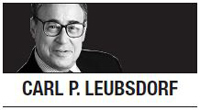 In a century-old house in Reykjavik, Iceland, President Ronald Reagan and his Soviet counterpart, Mikhail Gorbachev, were discussing ways to curb nuclear weapons. Suddenly, their talks took a different and stunning turn.
In a century-old house in Reykjavik, Iceland, President Ronald Reagan and his Soviet counterpart, Mikhail Gorbachev, were discussing ways to curb nuclear weapons. Suddenly, their talks took a different and stunning turn.“It would be fine with me if we eliminated all nuclear weapons,” Reagan reportedly told the Soviet president. “We can do that,” Gorbachev replied, according to a later account by Ken Adelman, a US participant in the talks. And for several hours thereafter, they discussed that visionary prospect.
Eventually, to the relief of many US officials who saw nuclear arsenals as the principal deterrent to a US-Soviet nuclear war, they failed to agree, largely because Reagan rejected curbing tests of his missile defense system.
Ultimately, the two countries agreed to reduce their over-supply of medium-range and long-range nuclear missiles. In retrospect, the Reykjavik summit was viewed as an important event toward ending the Cold War. But it also stands as a warning of how things can get out of hand when presidents negotiate in private, seeking dramatic breakthroughs with unknowable consequences.
It happened to some extent with President Franklin D. Roosevelt’s World War II dealings with Soviet leader Joseph Stalin. And it seems especially apt as President Donald Trump prepares to meet North Korean President Kim Jong-un.
Based on his history as a deal-maker, and according to some reports, Trump sees an opportunity for the kind of headline-making agreement that would put his name in the history books. Jonathan Swan of Axios, one of the best-sourced reporters covering the White House, reported last weekend that a source who discussed North Korea with Trump said he thinks, “Just get me in the room with the guy, and I’ll figure it out.”
Analysts repeatedly told us during the era of US-Soviet arms negotiations that “the devil is in the details,” and that may be even more true in dealing with the North Koreans. After all, they have a history of dangling the prospect of far more concessions than they ultimately accept.
That’s why Kim’s announcement he was closing a nuclear test site and suspending long-range missile launches produced a cautious response from knowledgeable arms experts and even some administration aides. After all, there is some question whether the closed North Korean test site was outdated, and Kim’s predecessors also suspended testing in their effort to gain much-needed economic help from the US and its allies.
Trump, however, suggested he has already achieved something. “Wow,” he tweeted Sunday morning. “We haven’t given up anything & they have agreed to denuclearization (so great for World), site closure, & no more testing!” Press Secretary Sarah Sanders said North Korea had expressed “a will” for complete denuclearization in talks with South Korea, something of an overstatement at a time that goal still seems remote.
The good news is that, despite such unrealistic statements and Trump’s bizarre depiction of the North Korean despot as “very honorable,” top officials are making appropriately careful preparations for the proposed meeting, evidenced by the trip to North Korea by CIA director and Secretary of State-nominee Mike Pompeo.
Though Pompeo and other aides will presumably be present when the two leaders meet, that’s no guarantee of restraint. Secretary of State George Shultz, an experienced arms negotiator, was present at Reykjavik and, according to Adelman’s “Reagan at Reykjavik,” reacted to the proposal for scrapping all nuclear arms by saying, “let’s do it.”
In his public comments, Trump has alternated assertions of a likely agreement with Kim with warnings of what might happen without an accord. “If we don’t think it’s going to be successful we won’t have it,” Trump warned at a Florida news conference last week with Japanese Prime Minister Shinzo Abe, who fears any agreement that would remove or reduce the US nuclear presence that has protected Japan as well as Korea. Trump also said, “If the meeting when I’m there isn’t fruitful, I will respectfully leave the meeting.”
But the most likely outcome is something in between, perhaps an agreement to keep discussing a freeze on North Korean nuclear development. And the real question may be what Trump will do long term if it becomes evident Kim won’t give up the nuclear capacity that has been his ticket to being taken seriously by the United States.
Trump has repeatedly vowed to use military action if necessary to ensure denuclearization of the Korean Peninsula. His new national security adviser, John Bolton, has called for a pre-emptive US strike to destroy North Korea’s nuclear capacity, even if it provokes a North Korean counter-attack on South Korea that inflames the entire Korean Peninsula.
By agreeing to meet Kim, Trump has shown his confidence in his reputed deal-making capacity. But he acknowledged “only time will tell” if a deal is reachable. And no one can know how far he would go to get one — or what he’ll do if he fails.
By Carl P. Leubsdorf
Carl P. Leubsdorf is the former Washington bureau chief of the Dallas Morning News. -- Ed.
(Tribune Content Agency)
-
Articles by Korea Herald



![[Exclusive] Korean military set to ban iPhones over 'security' concerns](http://res.heraldm.com/phpwas/restmb_idxmake.php?idx=644&simg=/content/image/2024/04/23/20240423050599_0.jpg&u=20240423183955)

![[Graphic News] 77% of young Koreans still financially dependent](http://res.heraldm.com/phpwas/restmb_idxmake.php?idx=644&simg=/content/image/2024/04/22/20240422050762_0.gif&u=)



![[Pressure points] Leggings in public: Fashion statement or social faux pas?](http://res.heraldm.com/phpwas/restmb_idxmake.php?idx=644&simg=/content/image/2024/04/23/20240423050669_0.jpg&u=)










